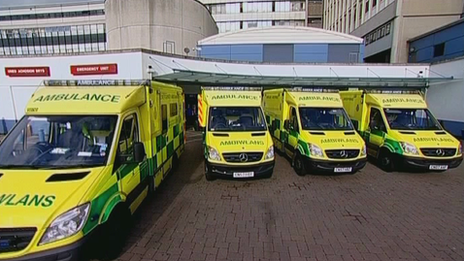Ambulance service fails to hit key 999 response target again
- Published

The Welsh Ambulance has only hit the key national target once since May 2012
The Welsh Ambulance Service has missed its target of reaching 65% of life-threatening incidents in eight minutes.
The figure for December was 57.6%, down from 63.2% in November.
Conservatives called it an extremely troubling slump, Welsh Lib Dems said patients across Wales were being failed and Plaid Cymru said improvements have still to happen.
The Welsh government said response times were better than they had been for the same period the previous year.
The ambulance service hit the key national eight-minute target for life-threatening calls last October, the first time it had been achieved since May 2012, but missed it again in November.
The Conservatives' shadow health minister Darren Millar described the figures as "another extremely troubling slump at a time when ambulance delays in Wales are already under the spotlight".
'Waiting times rocketing'
"Our Labour-run NHS is stuck in a vicious circle of crisis," he said.
"Bed-blocking leads to queuing ambulances, queuing ambulances leads to slower response times.
"All of this leads to scheduled ops being cancelled and waiting times rocketing."
Welsh Liberal Democrat leader Kirsty Williams said: "The [health] minister needs to be looking at why, after one month of achievement in October, response times are once again on a downward spiral.
"It's a sad fact that the Welsh Labour government is failing patients across Wales.
"Whether it is inadequate cancer care, poor ambulance response times or dire A&E waiting times, the Welsh Labour government is not offering a health service that patients in Wales deserve."
Elin Jones, who speaks for Plaid Cymru on health, said: "The government had claimed that the service was 'on a solid basis' for winter back in October when the service hit its target for the first time in over 18 months.
"Since then, the deterioration is worrying and suggests that improvements have still yet to happen despite assurances that they would.
'Spikey' demand
"It's also very concerning that over 340 ambulances took longer than 30 minutes to reach the scene," she added.
In a statement, the Welsh government said: "We are encouraged to note ambulance performance in December 2013 was higher than the same period in 2012.
"The ambulance trust experienced increased pressure in December with unpredictable and 'spikey' demand causing random peaks in the number of acutely ill patients requiring an emergency ambulance response.
"This is a reflection of pressure across the whole unscheduled care system.
"The figures show that 67.9% of cat A calls received response within 10 minutes, 83.6% within 15 minutes and 91.9% within 20 minutes.
"This is testament to the hard work of paramedics and ambulance trust staff who are often criticised for failing to achieve a target that is only very weakly backed by clinical evidence as a measure of best outcomes for patients," the statement added.
- Published23 December 2013
- Published19 December 2013
- Published27 November 2013
- Published30 October 2013